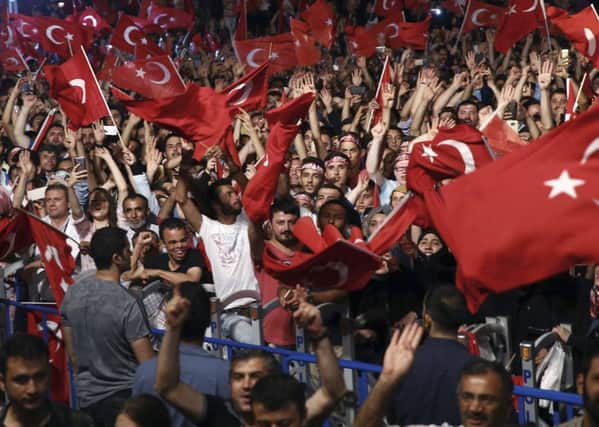Gulcin Ozkan: Turkey's coup nightmare


It was reported that the Turkish army had taken control of the Bosphorus Bridge and Ataturk airport in Istanbul. My first thought was that there must have been a suspected terror attack. However, it soon became clear that the Turkish army was attempting to topple the government, as a number of previous military interventions succeeded in doing in the past. It brought back painful memories of the last such episode I had witnessed as a child in the 1980s.
I quickly switched to Turkish news channels. Things were unfolding at an alarming pace; the junta soon got control of the state television (TRT) headquarters. The channel’s anchorwoman, visibly shaken, read out an “order from the Turkish Armed Forces”, announcing a curfew and martial law.
Advertisement
Hide AdAdvertisement
Hide AdMeanwhile, private channels remained on air and were broadcasting surreal scenes; the eerily empty bridge joining Asia and Europe, the tanks on the streets and the low-flying helicopters. It was soon obvious that the coup had been orchestrated by a faction in the army rather than the entire military and the army chief who refused to cooperate was being held hostage.
The turning point came when President Erdogan appeared on CNN Turk – the most widely watched TV channel in Turkey – through Facetime and called on the people to take to the streets. It only took minutes before people in large numbers were heading towards the bridge and to the airport; both under siege at the time.
What came next will never be forgotten; members of the army – for whom there had always been the utmost respect in Turkish society – opened fire on their own people. They were now dropping bombs on police headquarters, on the crowds gathering outside the presidential palace and more significantly, on the national parliament.
President Erdogan, who appears to have been the main target, was on vacation in the coastal town of Marmaris on Friday, away from his well-protected residences in Ankara and Istanbul, which made him much more vulnerable. Indeed, it is widely reported that if he had only stayed in Marmaris another fifteen minutes he would have been captured or worse. His hotel was raided just after he left, the cross-fire leaving several dead.
Advertisement
Hide AdAdvertisement
Hide AdIn addition to the people on the streets, the police department and the part of the military that didn’t participate in the plot were heavily involved in seizing control in the early hours of Saturday. By the time the president arrived in Istanbul, the airport had already been recaptured and by the morning the coup attempt had all but failed.
So who were the coup plotters and why did they do it? Although the full account will only be uncovered with time, there is widespread agreement that the coup was orchestrated by the network of the followers of Fethullah Gulen – an Islamic cleric living in exile in the US and a former ally of President Erdogan. Hence the failed coup was not an attempt by the fiercely secular army against an Islamic government, as widely reported in the media here. It was an ultimate power struggle that took a horrific turn with tragic consequences.
The one piece of good news from last Friday is that people were unanimous in rejecting the military intervention; all understood that a military rule was no way to right the wrongs of a democratically elected regime. And, if successful, the coup would have had disastrous consequences with a very real risk of a civil war in the country.
What is next? This is a watershed moment for Turkey, like 9/11 was for the US; things will never be the same again. The army lost massive ground, not to mention a large section of its workforce. Turkish society is deeply traumatised having had to fight against the army, resulting in significant casualties.
Advertisement
Hide AdAdvertisement
Hide AdThe country will now need a serious period of restoration. Since Friday, a large number of military personnel have been arrested and tens of thousands of public employees, including judges, teachers and academics, suspended. It is clearly very important that the state takes full control of the security situation. However, it is crucial that this does not turn into a witch hunt and a callous crackdown against all opposition.
The government could build on the unity shown by the supporters of all parties in defying and ultimately defeating the attempted coup, towards healing deep divisions in the society, repairing its democratic system and building a future for all its citizens rather than its own supporters. Alternatively, it could opt for a much more authoritarian, insular and populist regime.
Those of us with a deep affection for the beautiful country that was a rising star not so long ago, cling onto the hope that the choice will be for the former and not for the latter.
Professor Gulcin Ozkan is a member of the Economics department at the University of York.